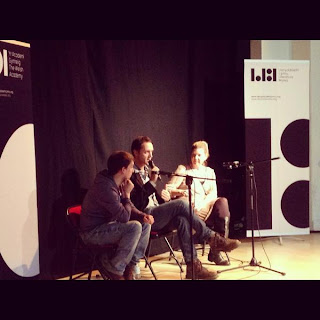MA SCRIPTWRITING FOR SCREEN MEDIA AND STAGE
Assessment Criteria For the Script:
- Effective dramatic representation of events, characters, themes and ideas.
- Successful emotional and intellectual engagement of the audience/reader in the action of a drama
- Keen awareness of tone and form
- The organisation of a story in a unified structure
- Emergence of personal voice
- A sophisticated understanding of genre conventions
This is a complex and ambitious script; it deals with the life of Milton, and the writing his most famous poem ‘Paradise Lost’ taking in the political and social history of that time, whilst also reflecting on the inner philosophical and religious meaning of the poem, and tying in those meanings with the life of the man.
In trying to turn this into a piece of dramatic writing, this draft is a huge improvement on the last. The new structure of telling the story through his time in prison is effective, and allows the story to flow between the past and present.
The characterisation of Milton is excellent; his beliefs, his passions and desires, his fears and his ambition. He is an extraordinary, singular man, who wrote an extraordinary poem, and the script revels in this in a surprising and thought provoking way with real intelligence.
The idea of “Heaven and Hell’ is at the heart of this film; hell is powerfully portrayed, I can feel the horror, which is unflinching, and we are introduced to his hell of the prison from the start, the idea of heaven should be as powerfully portrayed. The visual motifs of light and dark, and symbols of the snake etc are expressive; I would like to see them woven into the script more, with a more obvious motif/symbol for heaven and the light.
The relationship with Marvell is a real development, I think this too could be developed a little more; there is something about why Marvell does this noble act and the trust Milton places in him that could be considered.
This is a sophisticated piece of cinematic storytelling, and Peter’s voice is clearly there. It is a little short and would benefit with a little redrafting and addition of some scenes.
The essay should demonstrate:
- Ability to reflect on and analyse key aspects of narrative traditions, genre, techniques, motifs and modes of representation that have fed into your own script;
- Ability to analyse and explore ideas of market, genre, platform and content of your script
- Evidence of relevant reading and awareness of other plays/films/etc. shown in properly formatted references and bibliography in Harvard style.
This is a thoroughly researched essay; the range of filmic sources are appropriate and the analysis is good. The reading on story and theory, on genre, structure, character, is applied well. The reflections on the process on the development and writing of the script are good, as is the research and analysis of the market. Overall excellent.
Peter Gaskell
'In Sight of Heaven' is an impressively ambitious project with cinematic potential.
The script works really well as a dramatic representation of the writing of Paradise Lost. The structure of the writing of the poem during Milton's time in prison is an effective spine for the story. The visual motifs of light and dark and the telescope, sun and the snake work well though I feel these and other motifs could be woven in even further.
The script is very engaging and succeeds in portraying Milton's passions and beliefs. Peter is not afraid of showing us the horrors - the hell on earth - of the time. As well as the horrors there are some beautifully warm moments - an example being the relationship between Milton and his daughters. I feel that the relationship between Betty and Milton needs to be brought into focus a little more though, and that occasionally the script avoids emotional beats - there is a jump cut between Milton's reprieve and him already being married to Betty. I would have seen more focus on the two of them at this time.
This script is a massive undertaking and Peter's choice to structure Milton's life around the prison anchors the story really well. The script is currently a little short, and now that Peter has the structure in place I think he can afford to let the story breathe a little - one place I would suggest is Milton leaving prison and the decision to marry Betty as I mentioned above.
Peter is clearly a talented writer with a distinctive voice - his passion for this subject shines through in the writing. He has clearly researched and understood the particular genre this script belongs to.
Peter has researched and understood the possibilities and challenges of finding a market for a script like this. This is a big budget film and cast will be crucial in attracting finances. In this respect I would again refer to my notes on Betty's character and the emotional beats of the script - the more you can bring her character into focus the more chance you have of attracting a 'name' to the film.
Peter has researched, analysed and reflected on a wide range of material and has a good awareness of narrative traditions, genre, techniques, motifs and modes of representation that have fed into his script.



